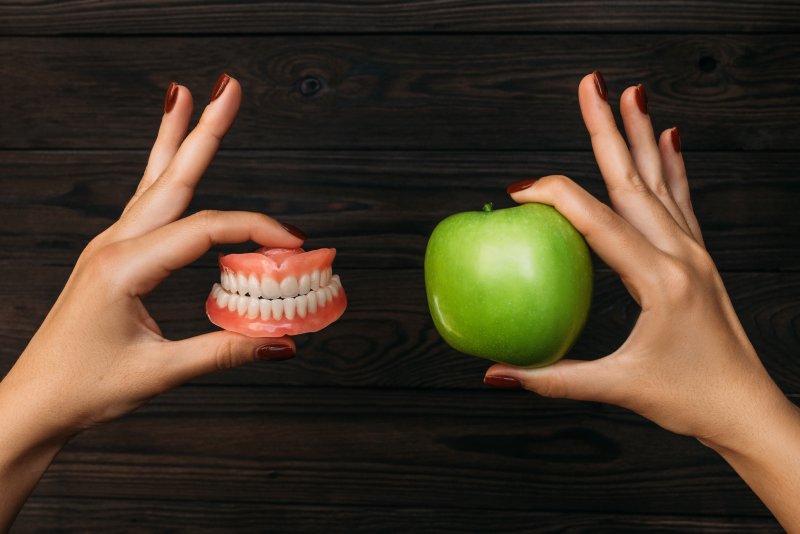
You likely know that dentures (if you wear them) impact your meals. That’s a given – the prosthetics let you eat foods you wouldn’t be able to otherwise. However, were you aware that dentures also affect your sense of taste? These devices can change a dish’s flavor if you don’t act carefully. Luckily, your Silver Springs dentist is here to help you avoid that issue. Read on to learn how dentures can disrupt your sense of taste and what to do about it.
How Dentures Can Affect Your Sense of Taste
Even if they seem lifelike, dentures can alter your sense of taste in ways natural teeth don’t. This effect often stems from:
Food Buildup
When dentures help you chew, they tend to build up food deposits, stains, and other debris. These elements can overwhelm your senses and trigger taste loss.
Low-cost dentures are especially prone to the “food deposit” issue. Due to their low-quality and porous plastic, they often pick up various odors and tastes. That means your breakfasts, lunches, and dinners may taste different from how they “should.”
Poor Fitting
Do you use adhesives to keep your denture secure? Well, those creams can affect taste sensations.
You see, denture creams aren’t tasteless. Patients using them typically describe a “metallic” flavor that disrupts the feeling of foods and drinks. In fact, those who overuse such creams and adhesives can suffer temporary taste loss.
A Covered Palate
If your denture covers your palate, expect changes in your sense of taste. It’ll likely make your meals seem bland.
The issue is that some upper dentures include a base plate. When present, this component covers your mouth’s palate – its roof – and the many taste buds on it. The result is that the plate keeps you from “tasting” your meals fully.
How You Can Compensate
Despite the factors above, you can keep dentures from harming your sense of taste. Just follow these helpful tips and tricks:
- Clean Your Dentures – If you clean your dentures daily, food deposits won’t cling to them. So, remember to rinse them after meals and brush them nightly with a toothbrush.
- Try Implant Dentures – When regular dentures are too disruptive, you can just switch to implant dentures. These kinds lack a base plate and don’t cover your palate.
- Talk to a Dentist – Consider talking to your dentist about the taste problem. They can check your mouth, assess the root cause, and offer reliable treatment.
You may lose your sense of taste someday, but don’t let your dentures add to the problem. Use the facts above so your new teeth let you enjoy tasty meals.
About the Practice
Dental Center of Aspen Hill is based in Silver Spring, MD. Led by our quartet of amazing dentists, our practice takes a very patient-centric approach to dental care. We offer preventive, cosmetic, and restorative treatments tailored to your unique smile, ensuring the best possible results. That also means our team will adjust your dentures to fit securely and comfortably! For more details or to book a visit, you can reach us on our website or by phone at (301)-871-8000.


